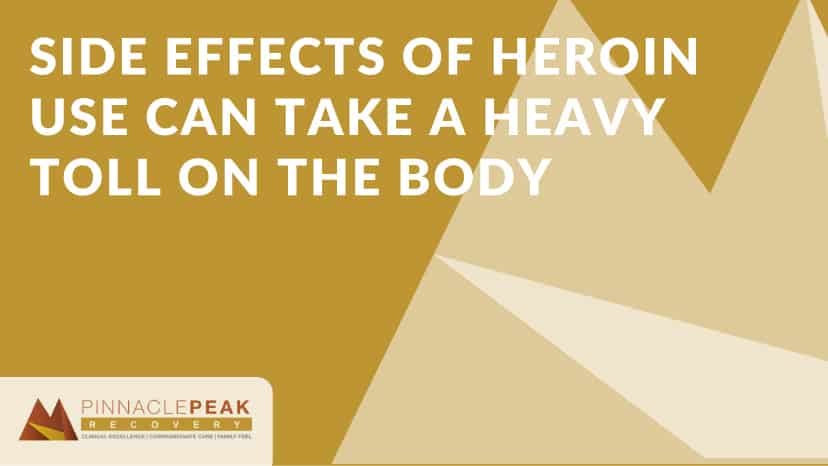Side Effects of Heroin Use Can Take a Heavy Toll on the Body
As the loved ones of a person using heroin, it feels like we are losing them every day to heroin. We watch helplessly as more and more of their time, money, energy, and focus become all consumed by this drug.
We miss them — the person they were before heroin took over their mind and body. The person that was full of light and love. Everything now seems so heavy. Heroin is a crushing, unforgiving weight.
To say it is simply hard or difficult to be an observer of our loved one’s struggle with heroin use feels like it is underplaying the real emotions experienced. Excruciating, agonizing, awful, terrible, unbearable, overpowering, too much, intolerable. All of these painful descriptions rise to the surface. In the midst of all this pain, there can be hope found in addiction treatment.
As the loved ones of a person using heroin, a good first step is to gain knowledge about the drug and its possible effects, so take heart that you have made it this far. Knowledge can help us gain control in what feels like very uncontrollable circumstances. You may be able to pass on this information to your loved one that is struggling to offer them a new and different perspective.
Armed with knowledge, the next step is to consider heroin addiction treatment options. Pinnacle Peak Recovery offers comprehensive, compassionate heroin addiction treatment in Arizona.
Keep reading to learn more about heroin, the short- and long-term side effects of heroin, how common heroin and opioid use is in Arizona, and treatment options available at Pinnacle Peak Recovery in Arizona.
What Is Heroin?
Heroin is a type of opiate drug prepared from morphine and taken from poppy plants. The appearance of heroin is white or brownish powder. Heroin can also come as a sticky black substance called “black tar heroin.”
Street names for heroin include Big H, Black Tar, Chiva, Hell Dust, Horse, Negra, Smack, and Thunder. Heroin can be consumed by injecting, smoking, sniffing, or snorting.
Heroin may include other drugs or substances like sugar or powdered milk. Unfortunately, the person using heroin is often not aware of how much actual heroin is in the drug they are taking. This inconsistency in the amount of heroin taken can lead to overdose.
Side Effects of Heroin Use on Health
Short-Term Side Effects of Heroin Use
People that use heroin report a sudden feeling of a “rush” (a surge of pleasure or euphoria). There are other common short-term side effects of using heroin, including:
- dry mouth
- warm flushing (blushing, reddening) of the skin
- heavy feelings in the arms and legs
- nausea and vomiting
- severe itchiness
- clouded mental functioning
- going “on the nod” (a back-and-forth state of being conscious and semiconscious)
Long-Term Side Effects of Heroin Use
People who use heroin long term may experience the following:
- insomnia (difficulty falling or staying asleep)
- collapsed veins for people who inject heroin
- damaged tissue inside the nose for people that sniff or snort heroin
- infection of the heart lining and valves
- abscesses (swollen tissue filled with pus)
- constipation and stomach cramping
- liver and kidney disease
- lung complications, including pneumonia and tuberculosis
- mental health disorders such as depression and antisocial personality disorder
- sexual dysfunction for men
- irregular menstrual cycles for women
Additives in street heroin may include substances that do not readily dissolve in the body. This may result in clogging the blood vessels that lead to the lungs, liver, kidneys, or brain. This can cause infection or even death of small patches of cells in vital organs. Immune reactions to these or other contaminants can cause arthritis or other rheumatologic problems.
Heroin and Opioid Use in Arizona
In Arizona, 1,106 opioid-involved deaths, or a rate of 15.9 per 100,000 people, were reported in 2018. Deaths involving synthetic opioids other than methadone (primarily fentanyl) increased nearly twofold to 522 deaths in 2018 (a rate of 7.7).
In 2018 in Arizona, heroin and prescription opioid-involved overdose deaths remained stable with a respective 352 (a rate of 5.2) and 362 (a rate of 5.0).
In 2020, Arizona medical providers wrote 40.5 opioid prescriptions for every 100 persons compared to the average U.S. rate of 43.3 prescriptions.
Heroin Addiction Treatment at Pinnacle Peak Recovery
Pinnacle Peak Recovery offers heroin withdrawal treatment. Pinnacle Peak Recovery has a safe, medical detox available for those withdrawing from heroin or other drugs. Generally, during detox, medications are prescribed to aid the body in tapering down from heroin or other drugs. Typically, detox lasts for five to seven days.
After completing detox, there are additional treatment options available, including rehab and outpatient care.
Pinnacle Peak Recovery prides itself on being able to offer a variety of therapeutic approaches, including dialectical behavior therapy (DBT), equine (horse) therapy, experiential therapy, fitness therapy, holistic therapy, individual therapy, meditation, therapeutic recreation, and yoga therapy.
At Pinnacle Peak Recovery, we have a dual diagnosis treatment approach. This means the focus of treatment will be placed on treating you as a whole person, which includes both your mental health and addiction needs. Our stance is that addiction and mental health are deeply intertwined. We understand that achieving success in recovery looks like addressing all of your needs.
Reach Out to Pinnacle Peak Recovery
If you or your loved one is struggling with heroin addiction, Pinnacle Peak Recovery in Scottsdale, Arizona, is here to assist. Our caring staff is here to listen to your concerns and prepare an individualized treatment plan to help you reach your short- and long-term treatment goals.
We will address both your addiction and mental health concerns to aid you on your path to gaining long-term recovery. There is hope after heroin use. You are worthy of living a healthier lifestyle. Call (866) 377-4761 to start your treatment journey with us.
FAQs
Does heroin cause heart palpitations?
When a person is high on heroin, they have a reduced heart rate. While going through withdrawal, a person has a rapid heart rate. Explained simply: the withdrawal effects are the opposite of the intoxicating effects. Heroin is definitely not healthy for the heart. A long-term side effect of heroin use includes infection of the heart lining and valves.
Is heroin a hydrochloride?
According to PubMed.gov, heroin is a hydrochloride of diacetylmorphine. Heroin was discovered by acetylation (reaction with acetic acid) of morphine.


